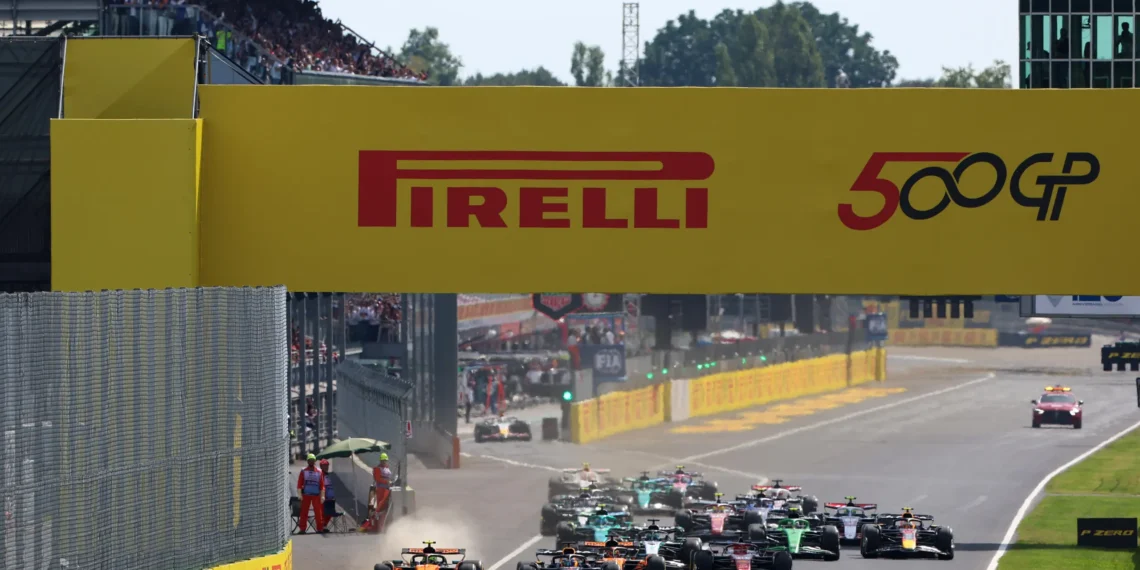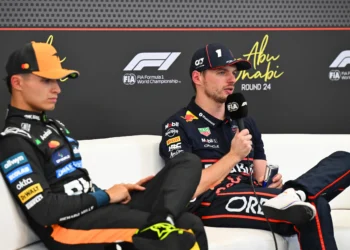Red Bull’s Monza Victory: A Fleeting Flicker of Hope or a True Resurgence?
In a dazzling display of speed and strategy, Red Bull Racing surged back into the limelight at Monza, clinching a victory that many pundits have dubbed a potential “rebirth” for the storied team. Max Verstappen’s triumphant 19-second lead over McLaren’s Lando Norris has sparked fervent speculation about the team’s future, but let’s pump the brakes on the euphoria. Is this victory at Monza a genuine turning point, or merely a mirage in a season riddled with inconsistency?
After a summer of struggle that saw the Milton Keynes powerhouse grapple with the unyielding pace of McLaren’s MCL39, the win in Italy marked the first Grand Prix triumph under the new leadership of Laurent Mekies. This victory could be seen as a much-needed shot in the arm for Red Bull, which had not tasted success since the Emilia Romagna Grand Prix earlier this year. However, the question looms: Can one race—no matter how impressive—be the foundation for a full-scale revival?
Despite the Monza win, Red Bull’s summer was characterized by a series of bitter disappointments. The team faced the harsh reality that the McLaren car was proving to be more adaptable and consistently fast, leaving Red Bull in a precarious position as the 2023 season nears its conclusion. With the current regulations on the verge of changing, it would be reckless to pour resources into a car that may soon become obsolete.
Nonetheless, there have been subtle but significant updates to the RB21, including a revamped floor specification for Verstappen that coincided with this extraordinary performance. After a season fraught with challenges, Monza emerged as a rare highlight where Red Bull showcased unassailable dominance, leaving McLaren scrambling for answers both in qualifying and in race pace.
In the ecstatic aftermath of the race, Helmut Marko, a key figure in Red Bull’s management, proclaimed the victory felt like a “rebirth.” He expressed his excitement, stating, “We’re all overjoyed, the atmosphere is fantastic, and the Red Bull spirit is back.” His enthusiasm, however, may reflect more hope than reality. Can this win genuinely signify a new dawn for Red Bull, especially after the tumultuous departure of Christian Horner as team principal?
Marko’s comments hint at a shift in team dynamics under Mekies. The new approach, emphasized by Mekies’ engineering background, aims to blend simulation data with the invaluable experience of drivers like Verstappen. This philosophy could lead to a more predictable and manageable car. Yet, can a mere change in perspective really yield revolutionary results in the ultra-competitive world of Formula 1?
Verstappen himself seemed invigorated by the victory, admitting post-race that he felt more in control of the car’s setup than he had in previous races. “We were not fully understanding what to do,” he admitted, hinting at a lack of clarity that had plagued the team throughout the season. With Mekies steering the ship, Verstappen noted, “He’s asking the right questions,” suggesting a newfound confidence in the decision-making process within the engineering team.
However, the path to redemption is still fraught with uncertainty. Despite Red Bull’s apparent resurgence at Monza, both Verstappen and Marko acknowledged that the team’s competitiveness remains track-dependent. The RB21 has shown potential in low-downforce setups, yet the team must continue to evolve if they hope to mount a formidable challenge consistently.
As the dust settles on Monza, the question remains: Is this victory a harbinger of a Red Bull renaissance or simply a fleeting moment of glory in an otherwise tumultuous season? Mekies himself was quick to deflect credit, emphasizing the collective effort of the entire team rather than any individual contribution. “The level of contribution is zero,” he stated, underscoring the collaborative nature of their success.
With the specter of Horner’s legacy still looming large, Red Bull finds itself at a crossroads. The coming races will determine whether the Monza triumph was a true turning point or a mere flash in the pan. As the team strives for more victories, all eyes will be on upcoming circuits, particularly those historically challenging for Red Bull, like Singapore.
One thing is clear: while Monza was a monumental step forward, the journey to reclaiming dominance in Formula 1 is far from over. The true test will come in 2026 when the influence of previous leadership fades, and the new Red Bull must prove it can truly rise from the ashes.







